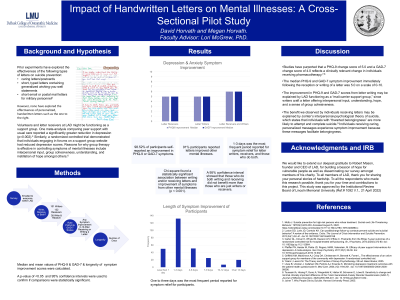Back

Clinical: General Topics
The Impact of Handwritten Letters on Mental Illnesses: A Cross-Sectional Pilot Study
Friday, March 31, 2023
12:00 PM East Coast USA Time

- DH
David Horvath, OMS (he/him/his)
Medical Student
Lincoln Memorial University
Clarksville, Indiana, United States
Presenting Author(s)
Background and Hypothesis: This paper is the first analysis of the effectiveness of personalized, handwritten letters in improving symptoms related to mental disorders. We believe writing or receiving handwritten letters will have a positive impact on mental illnesses.
Methods: In a cross-sectional study design via email, recipients, and writers of letters were asked to rate their symptom improvement on a scale of 0-10 immediately after receiving or writing a letter respectively. All inquired symptoms were derived verbatim from the patient health questionnaire-9 (PHQ-9) and general anxiety disorder-7 (GAD-7) questionnaire.
Results: The median score for symptom improvement as measured using the PHQ-9 scale for letter recipients and writers was 5.0 and 6.0, respectively. The median score for symptom improvement on the GAD-7 questionnaire for both letter recipients and writers was 6.0. One to three days was the most frequent period reported for symptom relief for both letter writers and recipients. A 95% confidence interval for the difference of means showed that those who are both writers and recipients did not benefit more than those who are just writers or recipients. Using the chi-square, we found a statistically significant association between letter writers and improvement of symptoms from other mental illnesses (p < 0.0001).
Conclusion: The 1-3 day relief from symptoms with letter writing and receiving is substantial and on par with pharmaceutical management. Since a PHQ-9 change score of 5.0 or more is a clinically relevant change with medication-assisted therapy, letter writing and receiving is comparable to the amount of relief gained using pharmacotherapy.
Correspondence with patients who have various psychiatric illnesses builds community, supports a healthy environment, and inspires hope for a better tomorrow. By encouraging psychiatric balance in patient's lives, we am addressing the root of osteopathic medicine- the person is a unit of body, mind, and spirit.
Acknowledgement of Research Study Sponsors and IRB: We would like to extend our deepest gratitude to Robert Mason, founder and CEO of LAD, for building a beacon of hope for vulnerable people as well as disseminating our survey amongst members of his charity. To all members of LAD, thank you for sharing your personal stories of hardship. To all the respondents who made this research possible, thank you for your time and contributions to this project. This study was reviewed and approved by the Lincoln Memorial University Institutional Review Board (IR Ref. #1092).
Methods: In a cross-sectional study design via email, recipients, and writers of letters were asked to rate their symptom improvement on a scale of 0-10 immediately after receiving or writing a letter respectively. All inquired symptoms were derived verbatim from the patient health questionnaire-9 (PHQ-9) and general anxiety disorder-7 (GAD-7) questionnaire.
Results: The median score for symptom improvement as measured using the PHQ-9 scale for letter recipients and writers was 5.0 and 6.0, respectively. The median score for symptom improvement on the GAD-7 questionnaire for both letter recipients and writers was 6.0. One to three days was the most frequent period reported for symptom relief for both letter writers and recipients. A 95% confidence interval for the difference of means showed that those who are both writers and recipients did not benefit more than those who are just writers or recipients. Using the chi-square, we found a statistically significant association between letter writers and improvement of symptoms from other mental illnesses (p < 0.0001).
Conclusion: The 1-3 day relief from symptoms with letter writing and receiving is substantial and on par with pharmaceutical management. Since a PHQ-9 change score of 5.0 or more is a clinically relevant change with medication-assisted therapy, letter writing and receiving is comparable to the amount of relief gained using pharmacotherapy.
Correspondence with patients who have various psychiatric illnesses builds community, supports a healthy environment, and inspires hope for a better tomorrow. By encouraging psychiatric balance in patient's lives, we am addressing the root of osteopathic medicine- the person is a unit of body, mind, and spirit.
Acknowledgement of Research Study Sponsors and IRB: We would like to extend our deepest gratitude to Robert Mason, founder and CEO of LAD, for building a beacon of hope for vulnerable people as well as disseminating our survey amongst members of his charity. To all members of LAD, thank you for sharing your personal stories of hardship. To all the respondents who made this research possible, thank you for your time and contributions to this project. This study was reviewed and approved by the Lincoln Memorial University Institutional Review Board (IR Ref. #1092).
